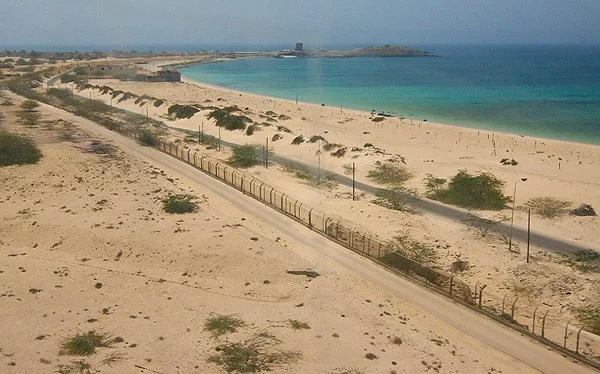

Abu Musa Island port (Image courtesy: Wikimedia Commons)
<p>
<strong>The long-standing territorial dispute between Iran and the United Arab Emirates (UAE) over the islands of Abu Musa, Lesser Tunb and Greater Tunb has flared up once again, this time at the 76th session of the United Nations General Assembly.</strong></p>
<p>
Nearly 10 days after it had slammed the Gulf Cooperation Council (GCC) for issuing &quot;annoying and threadbare statements&quot; on the ownership of three Persian Gulf islands, Tehran has now reacted strongly on the comments made by the Arab state from the podium at the UN headquarters. &nbsp;<br />
<br />
On Monday, while calling on Iran to &quot;respect international law, the principles of good neighbourliness, and to resolve disputes through peaceful means&quot;, UAE&#39;s Minister for State Khalifa Shaheen Almarar had commented that it must end its occupation of three islands and agree to resolve this dispute through direct negotiations or referral to the International Court of Justice.<br />
<br />
&quot;The UAE will never cease its demand for its legitimate sovereignty over the islands occupied by Iran since 1971, in flagrant violation of international law and the United Nations Charter,&quot; Almarar <a href="https://uaeun.org/statement/statement-by-his-excellency-khalifa-shaheen-al-marar-minister-of-state-of-the-united-arab-emirates-before-the-general-debate-of-the-76th-session-of-the-united-nations-general-assembly/">said</a> during the General Debate.<br />
<br />
Payman Ghadirkhomi, the Second Secretary of Iran&#39;s Permanent Mission at UN in New York, took the floor soon to respond to UAE&#39;s &quot;unfounded&quot; claims, saying that Tehran reiterates its consistent and principled position that it does not recognize the existence of any such dispute between Iran and the UAE.<br />
&nbsp;<br />
In his statement while addressing the General Debate, the Iranian envoy said that the three islands have been an inseparable part of Iranian territory and, therefore, any claim to the contrary is categorically rejected.<br />
&nbsp;<br />
&quot;Nonetheless, and to show its utmost respect for the principle of good neighbourliness, Iran has always expressed its readiness to talk with the UAE bilaterally with a view to removing any misunderstanding that may exist on the part of the UAE over Abu Musa Island,&quot; <a href="https://irangov.ir/detail/370879">said</a> Ghadirkhomi.</p>
<p>
<img alt="Persian Gulf " src="https://www.indianarrative.com/upload/news/islands.webp" style="width: 100%; height: 100%;" /></p>
<p>
<em><strong>Unofficial map for illustrative purposes only showing the islands of Abu Musa, Lesser Tunb and Greater Tunb (Map courtesy: UAE Foreign Ministry)</strong></em></p>
<p>
&quot;The representative of the United Arab Emirates should also be reminded that the term &#39;Persian Gulf&#39; has been the correct appellation for the body of water situated between the Arabian peninsula and the Iranian plateau since 500 B.C., and will remain so forever,&quot; he added.</p>
<p>
The three islands are strategically located in the eastern Persian Gulf, near the mouth of Strait of Hormuz which connects the Persian Gulf with the Gulf of Oman and the Arabian Sea and is regarded as the world&#39;s most important &#39;oil chokepoint&#39; because of the large volumes of oil that flows through it daily.<br />
<br />
Innumerable oil tankers and merchant ships have passed through the region since 1971 when Algeria, Iraq, Libya and Yemen had first approached the UN Security Council on request of the ruler of Ras al Khaimah who had accused Iran with aggression and invading the islands on 30 November 1971 after the withdrawal of Britishers from the Gulf and just two days before the establishment of the UAE.</p>
<p>
<img alt="Middle East Oil " src="https://www.indianarrative.com/upload/news/oil_map.webp" style="width: 100%; height: 100%;" /></p>
<p>
<em><strong>The Strait of Hormuz (shown in the oval on the map), which is located between Oman and Iran, connects the Persian Gulf with the Gulf of Oman and the Arabian Sea (Map courtesy: US Energy Information Administration)</strong></em></p>
<p>
Responding to the charges, Tehran had then <a href="https://www.un.org/securitycouncil/sites/www.un.org.securitycouncil/files/en/sc/repertoire/69-71/Chapter%208/69-71_08-14-Question%20concerning%20the%20islands%20of%20Abu%20Musa,%20the%20Greater%20Tunb%20and%20the%20Lesser%20Tunbpdf.pdf">stated</a> that there was &quot;no doubt&quot; that these islands belonged to Iran. The Iranian government told UN that whereas the arrangements made concerning Abu Musa had met with the approval of Sharjah, efforts to find a negotiated solution with regard to the Tunb islands had failed and Iran had &quot;had no alternative but to establish the exercise of its sovereign rights over what was Iranian territory&quot;.</p>
<p>
Iran said that it would not allow the territory of its off-shore islands to be violated; nor would it allow its sovereign rights over the islands in question to be infringed in any way. The Security Council had at that point deferred action to allow the countries an opportunity to negotiate.<br />
<br />
However, even after nearly 50 years, the debate over the sovereignty of the islands still continues.<br />
<br />
The UAE says that it has repeatedly sought to resolve the dispute &quot;peacefully and conclusively&quot; through the processes of international dispute resolution but Iran remains &quot;obdurate&quot;.<br />
<br />
It maintains that the islands were used, controlled and owned by the Qawasim tribe since the 18th century, more than 200 years before the Iranian occupation of 1971.<br />
<br />
The Qawasim are the direct tribal predecessors of the current rulers of Sharjah and Ras al Khaimah, two of the UAE&#39;s constituent Emirates.<br />
<br />
&quot;Contrastingly, there is no historical evidence that any tribes, dynasties, or states other than Qawasim ever inhabited or claimed ownership of the islands, or indeed ever used the islands in any way other than in an occasional and sporadic manner,&quot; says the UAE Foreign Ministry.</p>
<p>
<strong>Also Read: <a href="https://www.indianarrative.com/opinion-news/chabahar-to-cultural-connect-how-iran-became-a-key-member-of-the-sco-115495.html">Chabahar to cultural connect, how Iran became a key member of the SCO</a></strong></p>
The Russian military has carried out a series of strikes on Ukrainian military-related targets in…
India's toy industry, once heavily dependent on imports, is now manufacturing domestically and exporting to…
Members of the Indian diaspora and several artists in Argentina welcomed Prime Minister Narendra Modi…
Sub Lieutenant Astha Poonia officially became the first woman to be streamed into the fighter…
As Israel awaits Hamas's response on Friday to the latest proposal for a hostage release…
Deputy Chief of Army Staff (Capability Development and Sustenance), Lieutenant General Rahul R Singh, on…